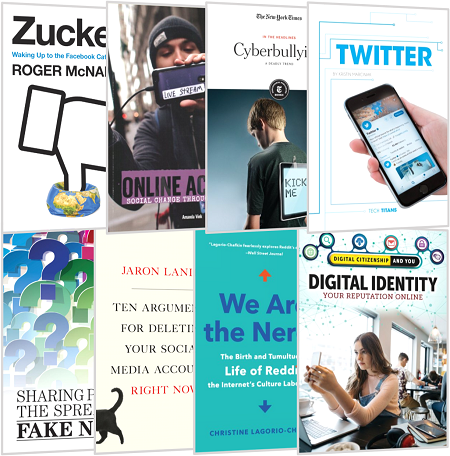

BLOGS > JUNE 14, 2019
BY STUART CROUCH

If you are reading this, the chances are that you have one of four things in front of you: a phone, a tablet, a laptop or a desktop computer. Where you are reading it, however, is another matter. Maybe on the bus, at home, in bed, at work, at the beach, at the dinner table or in a cafe. Our devices are a constant link to a world beyond our limited physical horizons, and if human beings are indeed social animals, then we shouldn't be too surprised at the explosion of social media in the past decade.

If you like numbers, here’s an enormous one: In 2019, it is estimated that there will be around 2.77 billion social media users around the globe, up from 2.46 billion in 2017. Social network penetration worldwide is ever-increasing. In 2017, 71 percent of internet users were social network users, and I’m guessing you are one of them.
With a potential audience of nearly three billion people, it’s worth asking ourselves what we are doing with social media and how we can make it work for us. For example, Facebook allows me to stay in touch with old friends and new, spread out across every continent. I only use it for this purpose, but friends of mine post their political and social views, appeals for help and donations and links to an eye-watering range of interests, hobbies and take a look at this…it’s hilarious! memes and videos. I also use Twitter, this time as a platform to air my views, post about my school libraries, read opinions from people from across the globe and support causes that are important to me. They are the only two platforms that I use, but think of Instagram and Snapchat and the younger audiences that they have engaged. And what about the professional platforms that keep us linked and networked like our very own Follett Community or the IB Communities? Take a moment to think about your own social media use today and then a projection into the future of how you could be using it. Done? Read on.
Social Media In Education
What are your feelings about social media in schools? In an age where one-size-fits-all just doesn’t cut it anymore, and individualised learning is growing in scope, social media can be a way to engage young people’s enthusiasm in a positive way. However, some schools seem to be struggling to catch up with social media use. Some have banned the use of phones during lesson time altogether, and some limit the use of certain apps by creating firewalls that throttle the bandwidth for certain apps, whilst others embrace and harness the power for education that phone use and social media can bring. So, what does your school do?

At the International School of Dusseldorf, phones are allowed and used during class for educational purposes, though there are times when phones might be collected during assessments, or when students are told to turn them over, face-down, in the same way that the instruction “crocodile!” causes a flurry of laptop screens to be half-closed. As much as we might support phone and social media use, however, we also recognise the potential dangers. Around school, we have fliers and posters from our safeguarding/child protection team that help students if they are being mobbed or bullied online. This is one of the unfortunate realities of social media and a reminder that all parents and educators should be concerned about, and aware of, the role that social media can play in the exploitation of young people.
On a brighter note, social media can be used to shed light on movements and causes that spring up, such as #MeToo and recent efforts of young people to highlight the dangers to the world’s environment. It is a cause for pride to see that the future of the world is in the hands of young people with such a broad range of causes and interests.

So, how can we use social media in a safe environment? One of our science teachers, Michael, has come up with a novel idea to allow students to post on Twitter safely. He logs on to his own account and allows students to post from there, anonymously. By doing this, students are able to air their views (most recently on climate change and environments that are under threat) and keep their identities private. Michael is able to keep an eye on the content of the posts. Clever, huh?
I’d love to get involved. What do I do now?
I’d love to get involved. What do I do now?
This is the reality in which libraries and librarians find themselves. How do we create a social media presence, how do we navigate the pitfalls and how do we showcase what is going on in our libraries? This topic was discussed at a recent Follett European Workshop in The Hague, Netherlands, where I asked the assembled librarians to think about how they use, or would like to use, social media in their own libraries. The results were exciting and were a cause for some serious reflection.
But before we look at that, here are a few starters for you to be thinking about whilst reading on: what social media platforms do your students, their parents, your colleagues and the wider community use? Within your library setting, do you have colleagues or even volunteers who also use the same platforms (meaning, can they help you in your drive to harness and promote social media)? For each platform, what are the potential dangers? With these points in mind for your own particular setting, let’s now hear what the European librarians had to say:
"Tweetbeam is a great platform, that shows a visual representation of tweets. Great for events, as it can follow a hashtag."
"Instagram Stories allows users to post resources and messages that are then deleted automatically after 24 hours. Very useful for building social media presence around events."
"Twitter and Instagram can be useful because following someone’s account does not force them to follow you. This can be useful for libraries that want to put out information but avoid following others."
"Libraries might want to exercise caution when asking students to use a school Twitter account: part of the beauty of social media is the ‘instant gratification’ effect of seeing your name out on the blogosphere."

What do the experts say? A common issue is that it can be difficult to create a multidirectional conversation (library to students and community, students and community to library and, importantly, students and community commenting on and helping to promote the library). At the International School of Dusseldorf, I sat down with our communications team, Anna and Patrick, to find out how our school uses social media and how we would like to in the future. Here’s a summary of the conversation:
...We have 1500 followers on our external Facebook site (open to all), 600 on our internal community Facebook page (registered users, who are current members of our community) and 210 followers on Twitter.
...We often do “double-dipping”, putting the same story in different formats, with or without links and images, on all of the platforms that we subscribe to.
...Teachers have access to the school Twitter account so that they can post safely and anonymously, without having their identities made public. They can also post using their own Twitter accounts.
...Open communication can also have pitfalls, when negative content “explodes.” The communications department tries to focus on positive issues, showing how students are engaged within the school and beyond the four walls.
...Instagram has been difficult because students tagged the school in their posts. Some of these were not appropriate.
...Anna and Patrick find Google Analytics very useful to gauge the use of the school website, including being able to see which pages are navigated to most often.
...Some ideas for library social media use:
Reading List The folks at Follett have put together a reading list of titles that are available for purchase. The list contains more than 50 titles and the topics include:

If you're looking for an overview, you might want to start with Safe & Sound: Social Media by Paul J. Larson. Written with teens in mind, topics include the origins of social media, how it can help you, how it can hurt you, cyberbullying and navigating social media.
I hope this blog post will help you consider how you use social media in your schools. If you want more tips or ideas, just type tips for social media use in schools or school libraries into your favourite search engine.

STUART CROUCH
Stuart Crouch is Head of Senior School Libraries at the International School of Dusseldorf, Germany. He is a lead moderator for International Baccalaureate® Communities and an educational moderator for Follett Community. Follow Stuart on Twitter at @MrStuartCrouch, or take a look at https://www.stuartcrouch.net. Contact Stuart at crouchs@isdedu.de.
An Author Interview with Drew Daywalt
June 27, 2025
Drew Daywalt, award-winning author of the best-selling The Day the Crayons Quit series, is about to release his second middle grade book with illustrator Mike Lowery, No Sam! and the Meow of Deception. The title continues the hilarious adventures of Sam...
Read more
An Author Interview with Adam Wallenta and Makana Wallenta
June 27, 2025
Get ready to rock the galaxy with the first volume of Punk Taco – a wildly imaginative, music-fueled sci-fi adventure from father-son duo Adam and Makana Wallenta. Created when Makana was just five years old, this award-winning graphic novel now debuts...
Read more
An Author Interview with Lisa Manuzak Wiley
June 27, 2025
A bewitching new graphic novel series is arriving this fall!Author-illustrator Lisa Manuzak Wiley, who grew up in Hawaii, blends cozy fantasy, sisterhood, and tropical charm in a heartfelt homage to her roots: The Witches of Pepperwood Bay Vol. 1. Lisa...
Read more
What We're Reading – Books to Add to Your TBR List
June 4, 2025
As a Follett Content Outside Sales Consultant, I’m not only an avid reader, but also a passionate book reviewer! I’ve curated my top 10 book picks that are perfect for adding to your To Be Read (TBR) list. These titles...
Read more
Author Joseph Koszary on the Changes Made to the International Baccalaureate Extended Essay
May 22, 2025
As someone who’s served as an extended essay coordinator, examiner, and supervisor, I’ve grown deeply familiar with the previous incarnation of the extended essay (EE). Like many of you, years of accumulated experience have made supporting students through the process...
Read more
Celebrate Literacy All Year Long: Host an Online Book eFair!
May 12, 2025
Reading and literacy are essential parts of our lives, and there are numerous events throughout the year dedicated to celebrating and promoting these important skills. Hosting a Follett Book eFair is a fantastic way to engage your school community, share the...
Read more